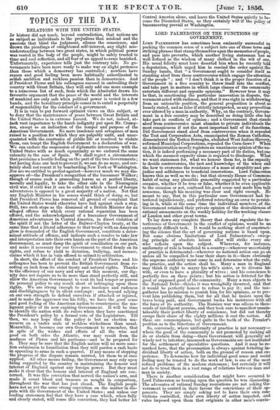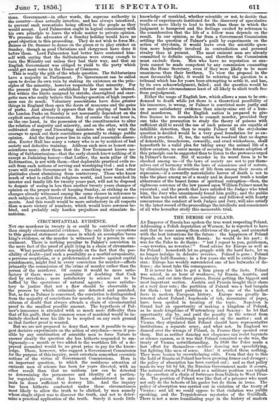LORD PAIMERSTON ON THE FUNCTIONS OF GOVERNMENT.
Loan Paraimarow has sometimes been eminently successful in packing the common sense of a subject into one of those terse and striking phrases that stamp themselves upon the memories of people, and pass into proverbs, which another living statesman has so well defined as the wisdom of many clothed in the wit of one. His usual felicity must have deserted him when he recently told a deputation, which urged him to rescind the order against -the Sunday bands, that a Government ought to consider itself as standing aloof from those controversies which engage the attention of the people" ; and " I don't think it is the proper function of a Government in a free country to throw itself into the conflict, and take part in matters in which large classes of the community entertain different and opposite opinions." However true it may be that, in sanctioning the particular innovation in dispute, Go- vernment acted with rashness, and that it was right in withdrawing from an untenable position, the general proposition is about as loosely stated, and as false if strictly interpreted' as any proposition ever uttered by a man in authority. Why, on this contrary, Govern- ment in a free country may be described as doing little else but take part in conflicts of opinion ; and a Government that stands :aloof from controversies must abandon to private individuals the most conspicuous if not the most important half of its functions. Did Government stand aloof from controversies when it repealed -the Test and Corporation Acts, emancipated the Roman Catholics, dismembered the Rotten Boroughs, abolished West Indian Slavery, reformed Municipal Corporations, repealed the Corn-laws? When an Administration merely registers an unanimous opinion of the na- tion, it is indeed performing a necessary part of its duties, but one which the meanest capacity alone is required to discharge. What we want statesmen for, what we -honour them for, is the capacity to decide controversies, the tact and knowledge of the when and the how to overcome the resistance of a mass of stupidity and pre- judice and selfishness to beneficial innovations. Lord Palmerston knows this as well as we do ; but that slovenly House of Commoirs baba of using any plausible generality suggested by a particular occasion, whether it be true or false, whether it be even a ylcable -to the occasion or not, confused his good sense and made is nonsense, though his meaning was clear and right enough. He meant to say, that in this particular case Government had in- terfered injudiciously, and preferred retracting an error to persist- ing in it, while at the same time the individual members of the Government retained their private opinion of the desirableness of rational amusements on the weekly holiday for the working classes
of London and other great towns. 1
To lay down any complete theory that should regulate the in- terference of Government in the conflict of opinions, would be an extremely, difficult task. It would be nothing short of construct- ing the science that the art of governing nations is based upon. But some obvious limitations of Lord Palmerston's sweep- ing. principle of absolute laissez slier will strike every one who reflects upon the subject. Wherever, for instance, uniformity of rule is beneficial to a country—wherever uncertainty of practice is detrimental—wherever no national action can go on unless all be compelled to bear their share in it—there obviously the supreme authority must come in and determine what the rule, the practice, and the action shall be. Many a man in England may think it right to marry his wife's sister, or to divorce his e, or even to have a plurality of wives ; and his conscience is perfectly free on these points ; but his action is fettered for the good or supposed good of the community. Many, a man objects to the National Debt—thinks it was wrongfully incurred, and that it would be perfectly honest to refuse to pay it; And the tax- gatherer has no mission to punish him for his opinions' or to pre- vent him publishing them, but for all that he insists upon the taxes being paid, and Government backs his insistence with all the force of its authority. The Ruisian war was odious to thou- sands of intelligent persons, and they took care to manifest unmis- takeably their perfect liberty of -conscience, but did not thereby escape their share of the eighty millions it cost the nation. All these are commonplaces, but quite in the teeth of the Premier's position as to the functions of Government.
So, conversely, where uniformityof practice is not necessary— where the good of the community is not promoted by making all do or abstain from doing—there Government will generally act wisely not to interfere, inasmuch as Governments are not instituted for • the settlement of speculative questions. And it may be re- marked here, that the presumption is always against fettering in- dividual liberty of action, both on the ground of reason and ex- perience. To determine how far individual good sense and social feeling may be trusted to do the work of law, is one of the most refined problems of the modern statesman ; but certainly it will not do to trust them in a vast range of relations between man and man in society. There is another consideration that might have occiured. to Lord Palmerston as bearing upon the question he was discussing. The advocates of rational Sunday recreations are not asking Go- vernment to control in their favour the convictions of their op- ponents. They are simply asking not to have their own. coat- notions controlled, their own liberty of action impeded, and • rules imposed upon them that originate in other men's convic-
tions. Government—in other words, the supreme authority in the country—does actually interfere, and has always interfered, to prevent such recreations being offered to the people as they would accept. Lord Palmerston ought in logical consistency with his own principle to leave the whole matter to private opinion. We presume the advocates of a Sunday holiday would have no great objection to this proceeding. They do not wish to force Mr. Babies or Dr. Sumner to dance on the green or to play cricket on Sunday, though as good Christians and clergymen have done it before them. Lord Palmerston had. better have contented him- self with saying that the Sabbatarians were strong enough to turn the Ministry out unless they had their way, and that an English Government was obliged to yield to the party • which could get most votes in the House of Commons. This is really the pith of the whole question. The Sabbatarians have a majority in Parliament. No Government can be called upon to devise its own ruin by staking its existence on the prin- ciples of the minority, however respectable that minority. For the present the practice established by law cannot be altered. But within the limits assigned by statute, clearsighted and ener- getic men who really believe this Sundayquestion of high import- ance can do much. Voluntary associations have done greater things in England than open the doors of museums and the gates of parks. And already it appears that the playing of bands in the London Parks on Sunday is not necessarily dependent on the explicit sanction of Government. But of course the real lever is, on the one hand, in the possession of the constituencies to alter the relation of majority and Minority, and on the other, with the cultivated clergy and Dissenting ministers who only want the courage to speak out their convictions generally to change public opinion. And the final power lies in calm and reasonable discus- sion. Exeter Hall has many a votary who is so by accident of bad society and defective training. Address such men as honest con- scientious men ; show them that the New Testament knows no- thing of Sa.bbatarianism—that the early church knew nothing of it except as Judaizing heresy—that Luther, the main pillar of the Reformation, is not with them—that deplorable practical evils re- sult from suck notions of serving and worshiping God ; and a few years will enable Government to do something wiser than utter platitudes about abstaining from controversy. Those who know much of what is called the religious world, and have watched its interior and family life for twenty years past, will not be disposed to despair of seeing in less than another twenty years changes of opinion on the proper mode of keeping Sunday, as striking as the changes already witnessed among the same classes in reference to such subjects as art, literary fiction, and the elegant social amuse-. ments. And this result would be more satisfactory in all respects than a were victory of numbers, which would leave soreness be- hind, and probably only harden prejudices and stimulate fa- naticism.



































 Previous page
Previous page